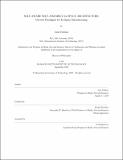Self-aware self-assembly for space architecture : growth paradigms for in-space manufacturing
Author(s)
Ekblaw, Ariel C.(Ariel Caitlyn)
Download1227783345-MIT.pdf (14.48Mb)
Alternative title
Growth paradigms for in-space manufacturing
Other Contributors
Program in Media Arts and Sciences (Massachusetts Institute of Technology)
Advisor
Joseph Paradiso.
Terms of use
Metadata
Show full item recordAbstract
Humanity stands on the cusp of interplanetary civilization. As we prepare to venture into deep space, we face what appears to be an irreconcilable conundrum: at once a majestic domain for human exploration, while also a domain of unrelenting challenges, posing dangers that are fundamentally at odds with our evolved biology. The field of space architecture struggles with not only these environmental challenges, but also constrained physical dimensions (e.g., rocket payload fairings), risky astronaut space-walks and limited robotic mobility for assembly, and capricious budgets as political whims change. How might we incorporate the robustness principles and incremental additions of indeterminate-growth living systems into the habitats that will sustain us over time? We begin by exploring how to enable dynamic, self-assembling space structures that are informed by both inorganic and organic growth processes from complex Earth systems. How can we design, induce, and scale self-aware self-assembly to grow space architecture, natively, in orbit? We answer this call, for space architecture that builds itself, through transformative self-aware self-assembly--adaptive, responsive "living structures" that follow principles of tessellation and self-similarity to scale elegantly from common base units to modular space stations to future mega-structures. In an orbiting context, freed from the constraints of Earth's gravity, we can redefine how space architecture is conceived, designed, assembled, and lived within. These principles are applied across all four areas of thesis contributions: a novel design theory for space architecture realized in a portfolio of space structure concepts; systems engineering mission architecture and feasibility analyses for contextualizing proposed space structures in realistic aerospace deployments; physics simulation modeling for habitat-scale self-assembly dynamics in microgravity; and quasi-stochastic self-assembling tile hardware creation and evaluation across four space environment missions, culminating in a successful 30-day International Space Station experiment in March 2020. The thesis contributions center on the TESSERAE (Tessellated Electromagnetic Space Structures for the Exploration of Reconfigurable, Adaptive Environments) platform.
Description
Thesis: Ph. D., Massachusetts Institute of Technology, School of Architecture and Planning, Program in Media Arts and Sciences, September, 2020 Cataloged from student-submitted PDF of thesis. Includes bibliographical references (pages 217-231).
Date issued
2020Department
Program in Media Arts and Sciences (Massachusetts Institute of Technology)Publisher
Massachusetts Institute of Technology
Keywords
Program in Media Arts and Sciences